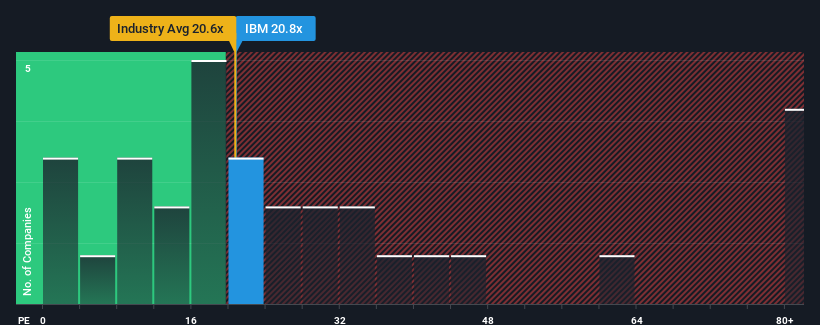- United States
- /
- IT
- /
- NYSE:IBM
Risks To Shareholder Returns Are Elevated At These Prices For International Business Machines Corporation (NYSE:IBM)

When close to half the companies in the United States have price-to-earnings ratios (or "P/E's") below 16x, you may consider International Business Machines Corporation (NYSE:IBM) as a stock to potentially avoid with its 20.8x P/E ratio. Although, it's not wise to just take the P/E at face value as there may be an explanation why it's as high as it is.
International Business Machines certainly has been doing a good job lately as its earnings growth has been positive while most other companies have been seeing their earnings go backwards. The P/E is probably high because investors think the company will continue to navigate the broader market headwinds better than most. If not, then existing shareholders might be a little nervous about the viability of the share price.
View our latest analysis for International Business Machines

How Is International Business Machines' Growth Trending?
There's an inherent assumption that a company should outperform the market for P/E ratios like International Business Machines' to be considered reasonable.
Taking a look back first, we see that the company grew earnings per share by an impressive 411% last year. Still, incredibly EPS has fallen 13% in total from three years ago, which is quite disappointing. So unfortunately, we have to acknowledge that the company has not done a great job of growing earnings over that time.
Looking ahead now, EPS is anticipated to climb by 5.3% during the coming year according to the analysts following the company. With the market predicted to deliver 10% growth , the company is positioned for a weaker earnings result.
In light of this, it's alarming that International Business Machines' P/E sits above the majority of other companies. Apparently many investors in the company are way more bullish than analysts indicate and aren't willing to let go of their stock at any price. There's a good chance these shareholders are setting themselves up for future disappointment if the P/E falls to levels more in line with the growth outlook.
What We Can Learn From International Business Machines' P/E?
Generally, our preference is to limit the use of the price-to-earnings ratio to establishing what the market thinks about the overall health of a company.
We've established that International Business Machines currently trades on a much higher than expected P/E since its forecast growth is lower than the wider market. When we see a weak earnings outlook with slower than market growth, we suspect the share price is at risk of declining, sending the high P/E lower. Unless these conditions improve markedly, it's very challenging to accept these prices as being reasonable.
We don't want to rain on the parade too much, but we did also find 1 warning sign for International Business Machines that you need to be mindful of.
Of course, you might find a fantastic investment by looking at a few good candidates. So take a peek at this free list of companies with a strong growth track record, trading on a low P/E.
New: AI Stock Screener & Alerts
Our new AI Stock Screener scans the market every day to uncover opportunities.
• Dividend Powerhouses (3%+ Yield)
• Undervalued Small Caps with Insider Buying
• High growth Tech and AI Companies
Or build your own from over 50 metrics.
Have feedback on this article? Concerned about the content? Get in touch with us directly. Alternatively, email editorial-team (at) simplywallst.com.
This article by Simply Wall St is general in nature. We provide commentary based on historical data and analyst forecasts only using an unbiased methodology and our articles are not intended to be financial advice. It does not constitute a recommendation to buy or sell any stock, and does not take account of your objectives, or your financial situation. We aim to bring you long-term focused analysis driven by fundamental data. Note that our analysis may not factor in the latest price-sensitive company announcements or qualitative material. Simply Wall St has no position in any stocks mentioned.
About NYSE:IBM
International Business Machines
Provides integrated solutions and services in the Americas, Europe, the Middle East, Africa, and the Asia Pacific.
Adequate balance sheet average dividend payer.
Similar Companies
Market Insights
Community Narratives



